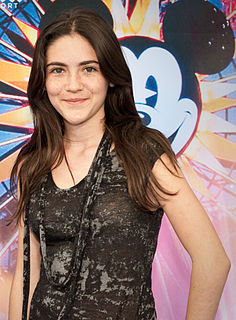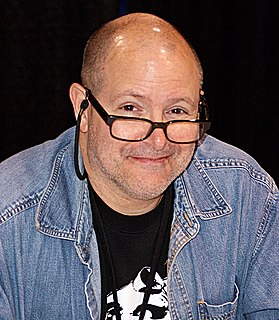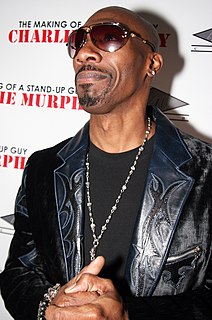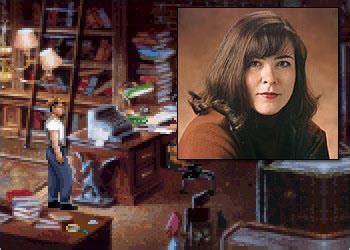A Quote by Laurie Halse Anderson
Who cares what the color means? How do you know what he meant to say? I mean, did he leave another book called "Symbolism in My Books?" If he didn't, then you could just be making all of this up. Does anyone really think this guy sat down and stuck all kinds of hidden meanings into his story? It's just a story.... But I think you are making all of this symbolism stuff up. I don't believe any of it.
Quote Topics
Related Quotes
But when I say it isn't meant for anyone's eyes, I don't mean it in the sense of one of those novel manuscripts people keep in a drawer, insisting they don't care if anyone else ever reads it or not.The people I have known who do that, I am convinced, have no faith in themselves as writers and know, deep down, that the novel is flawed, that they don't know how to tell the story, or they don't understand what the story is, or they haven't really got a story to tell. The manuscript in the drawer is the story.
When I say myself, I don't mean just as a woman of color, as a girl who's growing up in the Bronx, as people growing up in some way economically-challenged, not growing up with money. It was also even just the way we spoke. The vernacular. I learned that it's alright to say "ain't." My characters can speak the way they authentically are, and that makes for good story. It's not making for good story to make them speak proper English when nobody speaks like that on the playground.
What did you put in the fire?" Kaladin said. "To make that special smoke?" "Nothing. It was just and ordinary fire." "But, I saw-" "What you saw belongs to you. A story doesn't live until it is imagined in someone's mind." "What does the story mean, then?" "It means what you want it to mean," Hoid said. "The purpose of a storyteller is not to tell you how to think , but to give you questions to think upon. Too often, we forget that.
[Winning the White House was an achievement], but as an African-American, [Barack Obama], I think the symbolism is in how he conducted himself. The symbolism was in - and this sounds really, really small, but it's actually big for African-Americans - the symbolism was not in being an embarrassment, but to being a figure that folks were actually proud of.
I look at all of world mythology and folklore as my toy to play with. There are just so many characters and creatures there I want to put on paper. It's a really exciting thing for me to take material that I really love and put a new coat of paint on it and present it to this audience. And I don't have to make up any of the characters. I can just pull a book of mythology off the shelf and say, "I'll use this guy." I also hate making up names for fantasy characters. I'll just flip through these books and say, "Wow, this is way crazier than anything I could make up".
I literally make music for my wife and my friends. I don't feel beholden to my fans. I don't even really know who they are. But, I know that this whole thing started with me making stuff that I got off on, and I've gotta believe that that's how it's going to end, too. That's the only way it can go. There are a lot of artists who have gotten pretty caught up in that. That's why I like the defeatist attitude. Just assume that no one is going to like it and that no one cares, and you'll end up making something that you really like.
Translation is harder, believe it or not. You do have to come up with a story, and actually I'm mystified by that process. I don't exactly know how the story just comes, but it does. But in writing a story that you're inventing, versus writing a story that somebody else has made up - there's a world of difference. In translation you have to get it right, you have to be precise in what you're doing.
Comic books are just a way to show a story. Then there are the movies, and television and exhibits like this that take the stories and make them seem so realistic. In the comic book, you're just reading a story - hopefully a good, exciting story that whets your appetite for all of this stuff to come.
I would say I'm a storyteller first, but game making is very wrapped up in how I think of story. If I were to have a story idea, and I decided to write a novel with it instead, I'd have to very consciously de-couple it from gamedom - for example, deliberately add in things that could not be represented in a game scene.
I think that when I'm telling a story, I'm doing the best I can to tell the story as fully as I can, and if there are various fractures that happen in the story, then that's just the very thing that the story is as opposed to my looking for avenues of difference in one story. They just really do exist. For me, anyway.
It's Nathaniel Hawthorne Month in English. Poor Nathaniel. Does he know what they've done to him? We're reading The Scarlet Letter one sentence at a time, tearing it up and chewing on its bones. It's all about SYMBOLISM, says Hairwoman. Every word chosen by Nathaniel, every comma, every paragraph break -- these were all done on purpose. To get a decent grade in her class, we have to figure out what he was really trying to say. Why couldn't he just say what he meant? Would they pin scarlet letters on his chest? B for blunt, S for straightforward?





































